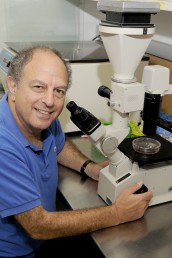Blocking key enzyme in cancer cells could lead to new therapy
Researchers from the University of Illinois at Chicago College of Medicine have identified a characteristic unique to cancer cells in an animal model of cancer — and they believe it could be exploited as a target to develop new treatment strategies.

Nissim Hay, professor, biochemistry and molecular genetics. Photo: Kathryn Marchetti (click on image for larger file size)
An enzyme that metabolizes the glucose needed for tumor growth is found in high concentrations in cancer cells, but in very few normal adult tissues. Deleting the gene for the enzyme stopped the growth of cancer in laboratory mice, with no associated adverse effects, reports Nissim Hay, UIC professor of biochemistry and molecular genetics, and his colleagues in the August 12 issue of Cancer Cell.
Targeting glucose metabolism for cancer therapy — while avoiding adverse effects in other parts of the body — has been a “questionable” strategy, Hay said. But he and his coworkers showed that the glucose-metabolism enzyme hexokinase-2 can be almost completely eliminated in adult mice without affecting normal metabolic functions or lifespan.
Hexokinase-2 is abundant in embryos but absent in most adult cells, where related enzymes take over its role in metabolism. One of the changes that mark a cell as cancerous is expression of the embryonic enzyme. Hay and his colleagues showed that the embryonic version is required for cancer cells to proliferate and grow, and that eliminating it halts tumor growth.
They developed a mouse strain in which they could silence or delete the HK2 gene in the adult animal, and they found that these mice could not develop or sustain lung or breast cancer tumors but were otherwise normal and healthy.
“We have deleted the HK2 gene systemically in these mice, and they have been living for more than two years now. Their lifespan is the same as normal mice,” Hay said.
The researchers also looked at human lung and breast cancer cells in the lab, and found that if they eliminated all HK2, the cells stopped growing.
“We think that the process we used to delete the HK2 gene is not absolutely perfect, so there must be some low levels of HK2 in the mice. But that seems to be enough for the cells that use HK2, and the therapeutic effects on tumors in these mice are stable.”
Hay thinks the enzyme is involved in making the building-blocks for the DNA of cancer cells, which need lots of all cellular components as they rapidly divide.
“Without HK2, the cancer cells don’t make enough DNA for new cells, and so tumor growth comes to a standstill,” said Hay.
Krushna C. Patra, Qi Wang, Prashanth Bhaskar, Luke Miller, Zebin Wang from UIC; Will Wheaton, Navdeep Chandel from Northwestern University Feinberg School of Medicine; Markku Laasko from the University of Eastern Finland, William Muller from McGill University in Montreal; Eric Allen, Abhishek Jha, Gromoslaw Smolen, Michelle Clasquin from Agios Pharmaceuticals; and Brooks Robey from Dartmouth Medical School also contributed to this research.
The research was supported by VA Merit Award BX000733, by NIH grants AG016927 and CA090764, and in part by the UIC Center for Clinical and Translational Sciences Award Number ULRR029879, and grant from the Chicago Biomedical Consortium with support from The Searle Funds at The Chicago Community Trust to Hay. Patra was supported by Defense Department predoctoral fellowship W81XWH-11-1-0006.
